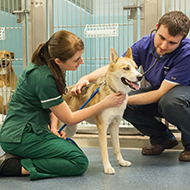Study reveals dog owner priorities for canine epilepsy research

Improving existing drug management was highlighted as a key area for future epilepsy research.
A new study has identified improving drug management as a primary area of research for owners and vets in the future treatment of canine epilepsy.
The findings, published in the Journal of Veterinary Internal Medicine, provide valuable insight into the importance of ensuring owners' views are included in future research - and that future research better improves the quality of life for affected animals and their owners.
In the study, researchers at the RVC and the University of Veterinary Medicine Hanover undertook prioritisation activities to highlight the most important and urgent research needs. They also looked at opinions on the emerging area of non-drug therapies for epilepsy.
A survey of 414 dog owners and specialist neurology and general practice vets revealed the areas of canine epilepsy research deemed most important. It also looked at how these views changed between 2016 and 2020.
Among the key findings were:
- the research areas with the highest perceived importance were improving existing drug management of epilepsy, the development of new antiepileptic medication and improving the education of vets regarding epilepsy
- the research areas ranked as the highest priorities were the development of new antiepileptic medication, identifying genetic causes of epilepsy, and non-drug management of epilepsy
- of 10 non-drug therapies, the five rated to have the highest potential positive impact on epilepsy management were behaviour management, gene editing, CBD oil supplementation, MCT oil supplementation and epilepsy surgery
- priorities differed between vets and owners, with owners prioritising day-to-day quality of life issues for their dog, such as behavioural issues or the side effects from medications. In contrast, the vet groups prioritised clinical issues, such as identifying the genetic causes of epilepsy and how different types of seizures are classified.
Co-author Professor Holger Volk of the University of Veterinary Medicine Hanover, added: "We all hope that our research makes a difference for pets, their owners and vets, but how often have we really explored what that means for the individual stakeholders? In this study, we have clearly shown that future research needs can differ depending on which group you ask. We do need to take this into account for our future research projects.”



 The latest
The latest